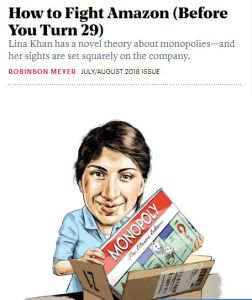Join getAbstract to access the summary!

Join getAbstract to access the summary!
Robinson Meyer
How to Fight Amazon (Before You Turn 29)
Lina Khan Has a Novel Theory About Monopolies – and Her Sights Are Set Squarely on the Company.
The Atlantic, 2018
What's inside?
Monopolies don’t have to rip off consumers to harm them.
Recommendation
Companies like Amazon, Facebook and Google have acquired an unprecedented amount of influence over people’s lives, and inevitably, there is pushback. In the United States, 29-year old legal scholar Lina Khan has become the face of a new movement that attributes the companies’ unfettered expansion to outdated antitrust legislation. Writing for The Atlantic, Robinson Meyer offers a lively portrait of Khan’s budding legal career and activism. To find out why Khan believes Amazon hurts consumers despite offering low prices, read Meyer’s insightful analysis.
Summary
About the Author
Robinson Meyer is a staff writer at The Atlantic, where he specializes in climate change and technology.



















Comment on this summary